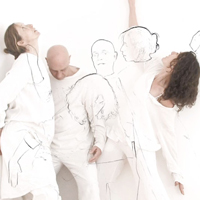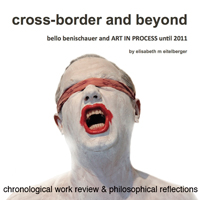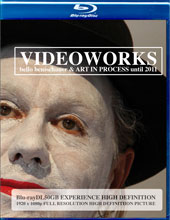FILE994.11
The video performances made in this context are based on the following concept: Bello’s initial idea: a woman taking different books out of a box, quoting passages, and putting them back in the box. Looking for material, Bello went to the Fremantle Library. He explained there briefly his idea and our general interest in this country’s past and presence,… especially concerning its multicultural society. The librarian showed him to view material, kept under a file number, which is the number in the work title. It marks the existing collection of oral and written history of the Fremantle (in Western Australia) area.
Synchronised Video Diptych: FILE 994.11 | Performers: elisabeth m eitelberger and bello benischauer
Out of the conversation Bello chose randomly and intuitively some extracts from the material: a list (still only kept on microfilm!) of convicts arriving in Fremantle, a text about women’s status in Western Australia, about Constitutional matters before 1900, a description about the situation in the prisons (Fremantle and on Rottnest Island), Oral History manuscripts and a passage from a book by a Fremantle Lady (who happened to witness Bello’s conversation with the librarian, and who showed him her book, in which she had written about her family’s personal history).
The librarian made photocopies of Bello’s chosen material and placed them in an orange file for him. The file had a white sticker on it saying “These files are in order.”
We tried to link our video performances with the above described material, in which we wanted to put attention to: how history is written, how it is preserved and kept as our heritage and how/if we pass it on/communicate it further.
Because we are interested in exploring, how we shape our world and which individual footprints we leave behind, we took a closer look to historical documents at large with this work and in particular to files of the Fremantle region, in which we live, and our children were born.
We worked in the performances through questions of how such documents would really provide us with enough evidence of the past. We wanted to look out for the voice of the underestimated, the convicted, the socially outcast, the poor, the ones that saw themselves overrun, unwanted and suddenly declared as a cultural minority,… we simply tried in this context to listen to the forgotten.
We tried to read between the lines, remembering the people lost in historical files, their fate and lives… it seems like their footprint wouldn’t have existed at all.
Immigration from Europe to Australia took place over the past two hundred years. History tells us that Indigenous Australians have originally found this place and many others after them. People settled here for different reasons. Different cultures have shaped this country. Culture clash has caused a lot of pain. There was the urge of some to take over this land, others… left to survive under environmental conditions that have claimed many victims. But this country’s history as its present is much more complex than that. People have worshipped this country; people had conflicts and fights with other people for possessing and exhausting natural resources,… dividing the land. It still is like that. We are all responsible for the footprints we leave behind and some footprints, good or bad, have faded away, excluded from and ignored by a history that was never theirs.
- This video is an Internet version only. Original work presented as single video performances next to each other, played synchronously, on two 50″ (127cm) High Definition Plasma TVs, mounted vertically.

 © EXISTENCE THEATRE ENSEMBLE
© EXISTENCE THEATRE ENSEMBLE MONOGRAPH – in progress
MONOGRAPH – in progress VIDEOWORKS BLU-RAY DL50GB
VIDEOWORKS BLU-RAY DL50GB